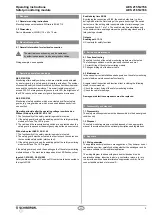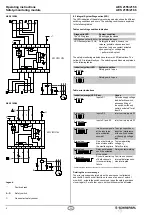
3
AES 2155/2156
AES 2165/2166
Operating instructions
Safety-monitoring module
EN
3 Mounting
3.1 General mounting instructions
Mounting: snaps onto standard DIN rails to EN 60715.
3.2 Dimensions
Device dimensions (H/W/D): 110 x 55 x 75 mm
4 Electrical connection
4.1 General information for electrical connection
The electrical connection may only be carried out
by authorised personnel in a de-energised condition.
Wiring examples: see appendix
5 Operating principle and settings
AES 2155/2156
Monitoring of two safety switches, which are simultaneously actuated
by a safety guard (e.g. safety guard, diversitary actuation). The number
of connected safety switches is restricted by the contract transition resist-
ance and the conduction resistance. This overall resistance must not
exceed 300 Ω. For magnetic safety sensors with LED, the brightness of
the LED’s reduce as the amount of guard doors opened increases.
AES 2165/2166
Monitoring of safety switches, which are actuated by different safety
guards (e.g. two guard doors, which are opened independently from
one another).
Operating principle after the operating voltage is switched on
Without start-up test AES 2155 / 2165
1. The functionality of the safety-monitoring module is tested.
2. If the safety guard is closed, the enabling path of the safety-monitoring
module will close. The LED is green.
3. The cable and the connected safety switch are only tested when the
safety guard is opened or the emergency stop button when actuated.
With start-up test AES 2156 / 2166
1. The functionality of the safety-monitoring module is tested.
2. The safety guard must be actuated, in order to check the cables and
the connected safety switch (start-up test).
3. If the safety guard is closed, the enabling path of the safety-monitoring
module will close. The LED is green.
If the safety guard is opened, the enabling path of the safety-monitoring
module will open. The machine is stopped and the LED flashes yellow.
Inputs S1-S14/S22; S2-S14/S22
Safety switches with one NC and one NO contact must be connected to
the inputs S1/S2.
Enable delay time X5/X6
By bridging the connections X5/X5, the enable delay time (i.e. time
during which after the first closing of the guard, bouncing of the switch
contacts or of the entire guard is possible without error message) can
be extended from 0.1 s to 1 s. The enable delay time simultaneously
is the minimum time, expiring between the guard being closed and the
relays being activated.
Outputs
Enabling path 13-14
NO contacts for safety functions
6 Set-up and maintenance
6.1 Functional testing
The safety function of the safety-monitoring module must be tested.
The following conditions must be previously checked and met:
1. Correct fitting of the safety-monitoring module
2. Fitting and integrity of the power cable
6.2 Maintenance
In the case of correct installation and adequate use, the safety-monitoring
module features maintenance-free functionality.
A regular visual inspection and functional test, including the following
steps, is recommended:
• Check the correct fixing of the safety monitoring module
• Check the cable for damage.
Damaged or defective components must be replaced.
7 Disassembly and disposal
7.1 Disassembly
The safety monitoring module must be disassembled in the de-energised
condition only.
7.2 Disposal
The safety monitoring module must be disposed of in an appropriate
manner in accordance with the national prescriptions and legislations.
8 Appendix
8.1 Wiring examples
The application examples shown are suggestions. They however do not
release the user from carefully checking whether the switchgear and its
set-up are suitable for the individual application.
The wiring diagram is shown with guard doors closed and in a de-
energised condition. Inductive loads (e.g. contactors, relays, etc.) are
to be provided with suitable interference suppression circuitry. Do not
connect additional loads to terminal S..
























